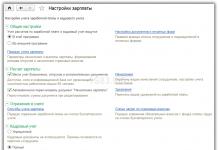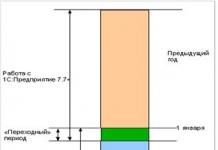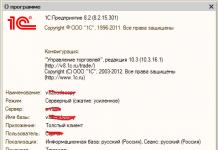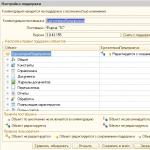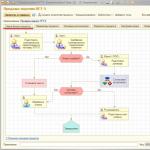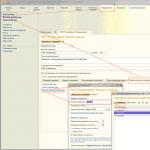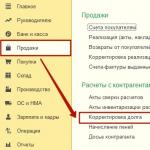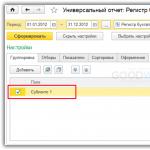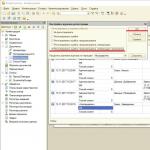Project summary.
The development of the project is due to the need to create conditions for the transition of the child from kindergarten to the school, which is milestone life is associated not only with a change in the environment of its development, but also with the corresponding processes of self-consciousness, with a collision with new problems, the discovery of new opportunities in oneself, etc. For some children, this is a feeling of entering a new stage of life, for others it inspires nostalgia for the usual life in kindergarten, and often gives rise to stressful conditions. Therefore, it is very important that in a preschool institution, elementary school, in the family they help the child to realize that kindergarten and school are links unified system education and upbringing. It is possible to solve the problems of succession only when a single line of development of the child is realized at the stages of preschool and primary school childhood. Only such an approach can give pedagogical process holistic, consistent and promising, only then the two levels of education will act in close relationship. In the concept of the content of lifelong education (preschool and primary level), continuity is seen as the connection, consistency and perspective of all components of the education system: goals, objectives, content, methods, means, forms of organization of upbringing and education that ensure the effective progressive development of the child. All this is possible provided that the principle of continuity between preschool and primary levels of education is observed.

Project passport
Project name:
Continuity in the work of kindergarten and elementary school as a condition for the successful adaptation of children to school life
 Project author:
Project author:
Pavlova Svetlana Alexandrovna - Deputy Director for Educational Work
Project type:
- practice-oriented, innovative (according to the way of activity)
- managerial (by content)
- direct (by the nature of coordination)
- long (according to the duration of execution)
- freedom of choice
- freedom of communication
- scientific
- tolerance
Methods:
- research
- partial search
Project implementation base: Makeevskaya comprehensive school I-III Art. No. 93 with a preschool division.
The creation of man is the highest tension of all spiritual forces. This is life wisdom, and skill, and art.
V. Sukhomlinsky
Regulatory - legal framework
- Law "On Education" of June 19, 2015 (Decree No. I-233P-NS)
- State educational standard of primary general education for 2015-2017.
- Programs of Primary General Education for General Educational Organizations.
- Letter No. 3517 dated August 20, 2015 “On methodological recommendations”
- State educational standard preschool education for 2015-2017
- Model educational program of preschool education “From birth to school”
Project relevance
On the present stage development of the education system, which is based on a humanistic approach to the organization of the pedagogical process, one of the urgent problems is to ensure continuity in the education and upbringing of children. Law of Donetsk People's Republic"On Education" emphasizes that it is continuity that is one of the necessary conditions for lifelong education, which ensures the unity of purpose, content, methods, forms of education, taking into account the age characteristics of children in related levels of education. The study of the problem of continuity between preschool and primary levels of education has deep historical and pedagogical roots. They testify that the issue of continuity between primary and preschool educational levels has always been legitimate, where it was the main condition for the functioning of preparing children for school, and preparation was the most important condition for the practical provision of continuity in the content, methods and organization of educational work in preschool and school levels of education. .
Objective of the project:
- Creation of continuity and successful adaptation during the transition from kindergarten to school.
- Providing a system of continuous education, taking into account the age characteristics of preschoolers and first graders.
- Organization of favorable conditions in kindergarten and school for the development of cognitive activity, independence, creativity of each child.
- Formation of sustainable motivation of each child for school life.
Project tasks:
- Find ways to update and improve the system of preschool and primary education.
- Direct independent and self-educational activities to solve the problem of continuity and prospects in the education and upbringing of preschoolers and younger students.
- To improve the psychological, developmental, educational and didactic principles for the implementation of continuity and perspective.
- Provide a systematic analysis of existing difficulties in the work preschool educators and teachers primary school, create a system of corrective action activities.
Psychological - pedagogical support project
Target: creation of conditions for maximum personal development and education of the child within the framework of the socio-pedagogical environment.
Tasks: psychologization of the environment, in particular, an increase in the general psychological culture of teachers, parents and other adults who are close to children.
Hypothesis
The implementation of the project "Continuity in the work of kindergarten and primary school as a condition for the successful adaptation of children to school life" will improve the preparation of children for school, successfully adapt first-graders at school, ensure the preservation of health, emotional well-being, promote the development of personality, create equal starting opportunities for all children of 6 years of age, allow to solve the problems of succession and involve parents in cooperation with teachers.
Directions of continuity of preschool and primary education
The implementation of directions is carried out according to the following links:

Psychological connection:
- study of the developmental features of children in the transitional stage;
- determination of the specifics of the transition from gaming to learning activities;
- ensuring the psychologization of the educational process as a condition for the formation of personality at two levels.
Methodical connection:
- mutual acquaintance with the methods and forms of educational work in the senior group and in the 1st grade educational institution;
- ensuring continuity in accordance with the methods and techniques of working with children in the development of speech, mathematics, familiarization with the outside world, physical, aesthetic, social education.
Practical connection:
- preliminary acquaintance of teachers with their future students;
- supervision by educators of their former pupils;
- forms of interaction of pedagogical teams: seminars, workshops, trainings (pedagogical communication, communication skills), joint work of a psychologist with teachers and educators of preschool groups);
- a system of visiting teachers of senior groups, monitoring the activities of children in the classroom and outside them; conversations with children and their caregivers; creation of a school for the future first-grader; organization of joint concerts, sports competitions; repair and manufacture of toys by children and the like.
The continuity of preschool and primary education is a multidimensional category that has complex structure and a wide range of functions.
Stages of project implementation:
1. Preparatory stage
- Studying the contingent of future first graders (studying the characteristics of pupils of the preschool unit of the Moscow School of Education No. 93).
- Conducting diagnostic studies to determine areas of work with children.
- Compilation guidelines for teachers, a psychologist to determine the direction of work with children in overcoming maladaptation.
- Involvement of educators, teachers, parents to work with future first-graders.
2. Main stage
2.1. Preparatory work with kids
- Readiness diagnostics schooling.
- Acquaintance of children with future teachers and classes where they will study (excursions).
- Correction-developing classes with children "School Day in Kindergarten".
- Conducting open classes by educators of the preschool unit of the educational institution.
— Organization open lessons in the 1st grade by elementary school teachers
– Individual and group work of a psychologist and speech therapist with older children preschool age.
- Joint celebrations and entertainment.
– Conducting binary lessons and classes with the participation of a teacher and educator.
- Circle work with children of older groups.
- Generalized courses "Psychological Path" and "Year to School" for older preschoolers.
– Classes with elements of fairy tale therapy “Forest School” for first graders.
– Music therapy pedagogy “SongZnayka”.
2.2. Working with parents
- Psychological and advisory service for parents of future first-graders. The work of parental universal education "Today a child - tomorrow a schoolboy."
- Parent meeting “Preparing for school. Acquaintance with the content of the program "From Birth to School" and new educational standards.
- Lectures: "Children's readiness to study at school", "Criteria for preparing a child for school", " Psychological readiness children to school.
- Family projects"Ecoworld of my family", "In the circle friendly family”, “Interaction between the family and institutions to strengthen the spiritual and physical health of children”, “Dad, mom and I - happy family».
- Open days.
- Psychological consultation center for parents of children of future first-graders.
2.3. Working with teaching staff
- Pedagogical Council "Continuity in the work of kindergarten and school, as a condition for ensuring a student-centered approach to educational - educational process».
- Creative group "Continuity is the key to success."
- Readings "Study and analysis of preschool and elementary school programs."
- Meeting of the "round table" "Future first grader" (consolidation of the efforts of educators, teachers, families to improve comprehensive education and training).
- Seminar - workshop "Psychological readiness of the child for school". Opinion exchange. Analysis and discussion of lessons at school and classes in kindergarten.
3. Summarizing - analytical stage
3.1. Study of the level of influence of the project on the process of adaptation of first-graders.
3.2. The diagram is a comparison of the number of children with problems in adaptation who attended the kindergarten at MOSH No. 93 with a preschool unit and those who were not brought up in this institution.
3.3. Summing up the results of the project implementation, making recommendations.
4. Corrective stage:
4.1. Monitoring the success of the project implementation.
4.2. Correction of identified deficiencies.
4.3. Conducting psychological and pedagogical consultations with project participants to make adjustments in their work (responsible members of the creative team, psychologist)
4.4. Conducting methodological operatives to assist educators, teachers, parents, and other project participants in the practical implementation of recommendations.

And get a certificate for attestation?
Objective of the project:
preventing and overcoming the difficulties of entering kindergarten and during the transition from nursery and junior to secondary groups in another preschool educational institution, maintaining the health and emotional well-being of pupils.
Description
Project “Continuity. Manger - garden "
Germogenova E.V., Deputy dir. on UVR Gymnasium No. 56
Saint -Petersburg,
teacher - psychologist;
Grigoryeva I.P., Head of GBDOU No. 92
Petrogradsky district, St. Petersburg
"On how the child will feel,
climbing the first rung of the ladder of knowledge,
what he will experience depends on the whole further path to knowledge.
V. A. Sukhomlinsky.
One of the primary tasks of the manager is the organization of the process of adaptation to new conditions of all participants in the process.
Each new period in a person's life is accompanied by new difficulties and experiences. Children are particularly affected by these difficulties. For a child who is used to playing at home, the situation of entering a kindergarten, in our case, a nursery or younger group of a kindergarten, is not easy.
The situation of entering kindergarten is not easy for parents. That is why the main work on the successful adaptation of the child in new conditions is carried out with parents. Some come to kindergarten without any problems, for others the problem of adaptation remains relevant. For the most effective solution of these problems, the specialists of the Preschool Department of the Gymnasium No. 56 and the specialists of the Gymnasium No. 92 developed the project “Continuity. Manger - garden "
Objective of the project:
preventing and overcoming the difficulties of entering kindergarten and during the transition from nursery and junior to secondary groups in another preschool educational institution, maintaining the health and emotional well-being of pupils.
Project objectives:
1.
Provide students with emotional comfort in the new environment.
2.
To help educators find the right ways and means of working with pupils adapting to new conditions.
3.
Develop ways to correct the problems of maladaptation.
4.
Inform parents about the problems of adaptation of children and the characteristics of a particular age period. Provide psychological help and support.
5.
Raise the level of professional competence of educators, pedagogical competence of parents.
Continuity
– the connection between phenomena in the process of development, when the new, replacing the old, retains some of its elements.
(Large encyclopedic Dictionary, St. Petersburg, 1999)
The implementation of succession helps to develop common approaches in training and education, ensures the preservation of existing traditions. Non-compliance with the rule of continuity in the general system of didactic principles of education and upbringing often becomes the reason maladaptation, and consequently, deterioration in the health of the pupil and teacher.
The project involves the interaction of employees of preschool educational institutions (heads, methodologists, educators, psychologists). The project is based on the basic principles of humanistic psychology and pedagogy and is focused on the close interaction of all participants educational process.
The project contains a system of informing all participants in the educational process in the form booklets
:
·
For educators
·
For parents.
Who carries out the succession?
Continuity in the education, upbringing, development of the child is carried out by:
·
kindergarten teachers;
specialists;
parents.
It makes no sense to talk about the psychological characteristics of early and younger preschool age, since we have colleagues who are not only theoretically, but also practically familiar with them. The teachers who work in the nursery have a crisis period of three years. How to deal with it? How to help parents? And here interaction with colleagues comes to the rescue, and it does not matter which preschool these colleagues are from.
Children attending a nursery come to kindergarten already more adapted than their peers who came to kindergarten for the first time.
We conducted a study to study how educators want to see their future pupils who came from nurseries and junior groups kindergarten.
Initially, we thought that teachers would talk about the development of attention, memory, thinking (visual-figurative). But it turned out that teachers are most concerned about the level of development of speech, self-service and socialization skills. Some pupils of GBDOU No. 92 end up in the Preschool Department of Gymnasium No. 56, and we observe a fairly high level of development of pupils. The main thing is that the children we observe are emotionally well and ready to explore the world further with interest and desire. That is why we have developed this project, a project of interaction, a project of friendship between the two institutions.
An important aspect is working with parents!
In GBDOU No. 92, this layer has been mastered, and parents, when moving to a new level, are prepared. The system of individual counseling before entering kindergarten, the work of the "Parents' Club", information booklets help to improve the pedagogical competence of parents.
The competence of a parent is a complex individual psychological formation that arises on the basis of the integration of experience, theoretical knowledge, practical skills and significant personal qualities, which determines his readiness to implement the educational function (Kostyleva N.E.). The competence of a parent expresses "the unity of his theoretical and practical readiness to carry out parental activities." As an integrative personal education, it is based on a number of competencies, manifested in knowledge and experience in a particular area. The totality of competencies that ensure readiness to implement the educational function forms the basis of parental competence. Being a competent parent means being able to mobilize in specific situation education of their own child available educational competence.
Parental competence is based on key and related competencies (E.V. Bondarevskaya). Key competencies include those that are of universal importance and can be used in various activities in solving a variety of educational tasks. Accompanying - those that are additional, allowing in-depth solution of individual tasks of personal development, reflecting the individual interests and passions of parents, the individual capabilities of children.
The development of parental competence is a complex and dynamic process carried out both in the course of family self-education and with the direct assistance of teachers of educational institutions.
That is why these blocks of the project were developed.
Working with parents.
·
First conversation.
·
Information booklets.
·
Parents' club "Support" on the basis of the Preschool Department of the Gymnasium No. 56.
·
Advisory support.
·
Questionnaire "Adaptation".
This project reflects the work with teachers and pupils.
Working with teachers
·
Expert advice.
·
Seminars "Adaptation", "Difficult child", "Work with parents", "Transformation of the game" (on the basis of the Preschool Department of the Gymnasium No. 56).
·
Round tables and consultations.
·
Information booklets.
Work with pupils
·
Individual and group Team work under FGT programs.
·
Keeping a "Diary of a pupil", hereinafter referred to as "Card of individual support".
·
Monitoring the emotional well-being of pupils.
Distance learning for teachers according to the Federal State Educational Standard at low prices
Webinars , professional development courses , professional retraining and vocational training . Low prices. Over 7900 educational programs. State diploma for courses, retraining and vocational training. Certificate for participation in webinars. Free webinars. License.
report on the continuity of the nursery garden and the competencies of parents.doc
"On how the child will feel,
climbing the first rung of the ladder of knowledge,
what he will experience depends on the whole further path to knowledge.
V. A. Sukhomlinsky.
One of the primary tasks of the manager is the organization of the process of adaptation to new conditions of all participants in the process.
Each new period in a person's life is accompanied by new difficulties and experiences. Children are particularly vulnerable to these difficulties. For a child who is used to playing at home, the situation of entering a kindergarten, in our case, a nursery or younger group of a kindergarten, is not easy.
The situation of entering kindergarten is not easy for parents. That is why the main work on the successful adaptation of the child in new conditions is carried out with parents. Some come to kindergarten without any problems, for others the problem of adaptation remains relevant. For the most effective solution of these problems, the specialists of the Preschool Department of the Gymnasium No. 56 and the specialists of the Gymnasium No. 92 developed the project “Continuity. Manger - garden "
Objective of the project:
preventing and overcoming the difficulties of entering kindergarten and during the transition from nursery and junior to secondary groups in another preschool educational institution, maintaining the health and emotional well-being of pupils.
Project objectives:
Provide students with emotional comfort in the new environment.
To help educators find the right ways and means of working with pupils adapting to new conditions.
Develop ways to correct the problems of maladaptation.
Inform parents about the problems of adaptation of children and the characteristics of a particular age period. Provide psychological help and support.
Raise the level of professional competence of educators, pedagogical competence of parents.
Continuity– the connection between phenomena in the process of development, when the new, replacing the old, retains some of its elements .
(Big Encyclopedic Dictionary, St. Petersburg, 1999)
The implementation of succession helps to develop common approaches in training and education, ensures the preservation of existing traditions. Non-compliance with the rule of continuity in the general system of didactic principles of education and upbringing often becomes the reason maladaptation, and consequently, deterioration in the health of the pupil and teacher.
The project involves the interaction of employees of preschool educational institutions (heads, methodologists, educators, psychologists). The project is based on the basic principles of humanistic psychology and pedagogy and is focused on the close interaction of all participants in the educational process.
The project contains a system of informing all participants in the educational process in the form booklets :
For educators
For parents.
Who carries out the succession?
Continuity in the education, upbringing, development of the child is carried out by:
kindergarten teachers;
specialists;
parents.
It makes no sense to talk about the psychological characteristics of early and younger preschool age, since we have colleagues who are not only theoretically, but also practically familiar with them. The teachers who work in the nursery have a period of crisis of three years. How to deal with it? How to help parents? And here interaction with colleagues comes to the rescue, and it does not matter at all what preschool institution these colleagues are from.
Children attending a nursery come to kindergarten already more adapted than their peers who came to kindergarten for the first time.
We conducted a study in order to study how the educators want to see their future pupils who came from nursery and younger groups of the kindergarten.
Initially, we thought that teachers would talk about the development of attention, memory, thinking (visual-figurative). But it turned out that teachers are most concerned about the level of development of speech, self-service skills and socialization. Some pupils of GBDOU No. 92 enter the Preschool Department of Gymnasium No. 56, and we observe a fairly high level of development of pupils. The main thing is that the children we observe are emotionally well and ready to explore the world further with interest and desire. That is why we have developed this project, a project of interaction, a project of friendship between the two institutions.
An important aspect is working with parents! In GBDOU No. 92, this layer has been mastered, and parents, when moving to a new level, are prepared. The system of individual counseling before entering kindergarten, the work of the "Parents' Club", information booklets help to improve the pedagogical competence of parents.
The problem of the formation of the psychological and pedagogical competence of parents is one of the most urgent in the system of domestic preschool education. Numerous regulatory and conceptual documents recognize parents as full subjects of the pedagogical process. Despite this, the implementation of the educational function of the family is ineffective due to the low level of psychological and pedagogical competence of parents.
The competence of a parent is a complex individual psychological formation that arises on the basis of the integration of experience, theoretical knowledge, practical skills and significant personal qualities, which determines his readiness to implement the educational function (Kostyleva N.E.). The competence of a parent expresses "the unity of his theoretical and practical readiness to carry out parental activities." As an integrative personal education, it is based on a number of competencies, manifested in knowledge and experience in a particular area. The totality of competencies that ensure readiness to implement the educational function forms the basis of parental competence. Being a competent parent means being able to mobilize the existing educational competencies in a specific situation of raising your own child.
Parental competence is based on key and related competencies (E.V. Bondarevskaya). Key competencies include those that are of universal importance and can be used in various activities in solving a variety of educational tasks. Accompanying - those that are additional, allowing in-depth solution of individual tasks of personal development, reflecting the individual interests and passions of parents, the individual capabilities of children.
The development of parental competence is a complex and dynamic process carried out both in the course of family self-education and with the direct assistance of teachers of educational institutions.
That is why these blocks of the project were developed.
Working with parents.
First conversation.
Information booklets.
Parents' club "Support" on the basis of the Preschool Department of the Gymnasium No. 56.
The project was created for performance at refresher courses.
1. The project itself (relevance, goals, objectives, etc. - text)
2. Implementation (work plan for the year)
3. Results (development stages, results and development prospects)
Download:
Preview:
Relevance. The transition of a preschool child to the school educational environment is his transition to a different cultural space, to a different age category and social situation of development. Ensuring the success of this transition is the problem of uniting the efforts of kindergarten and primary school workers. Thus, continuity should be built:
Based on age and psychological characteristics children 5 - 8 years old;
For the common purposes of raising and educating children;
On the unity of the requirements of adults (teachers, psychologists, parents), coordinating with the chosen educational program.
Goals:
Creation of continuity and successful adaptation during the transition from kindergarten to school.
Provide a system of continuous education, taking into account the age characteristics of preschoolers and first graders.
Creation of favorable conditions in kindergarten and school for the development of cognitive activity, independence, creativity of each child.
To captivate kindergarten children with the prospect of schooling, to arouse a desire to study at school.
Tasks:
Contribute to the strengthening and preservation of the health of preschoolers preparing for schooling.
Comprehensive development of children, allowing them to successfully master the school curriculum in the future.
Creation of favorable conditions for the mental and personal development of the child.
Project type : creative mixed type.
Project participants: children of the preparatory group for school - 25 people, kindergarten graduates (students of the 1st grade of the elementary school VSOSH No. 2) - 20 people, teachers and specialists of preschool educational institutions, elementary school teachers, parents.
Project development stages:
Duration: 1 year
Explanatory note.
Going to school is a turning point in a child's life. A new stage in the development of the baby begins with him: he will have to master forms of activity that are not always similar to the previous ones, develop a different style of relations with peers and adults, and physiologically rebuild.
Continuity in the work of the school and preschool institution, provides for the use of all forms of continuity: the study of programs, complex links, mutual exchange of experience, further search for optimal ways to improve pedagogical work, the formation of children's interest in classes, educational activities
Success in school education largely depends on the quality of knowledge and skills formed in preschool childhood, on the level of development of cognitive interests and cognitive activity of the child. The school constantly raises the requirements for the intellectual development of children. This is due to such objective reasons as scientific and technological progress; increasing the flow of information; changes taking place in our society, improving the content and increasing the importance of education; transition to education from the age of six.
The results of advanced pedagogical experience convince us that these requirements are natural, and their fulfillment is possible if educational work in kindergarten and school is a single developmental process.
Continuity- a continuous process of raising and educating a child, which has general and specific goals for each age period, i.e. - this is a connection between different stages of development, the essence of which is the preservation of certain elements of the whole or individual characteristics during the transition to a new state. (Soviet philosophical dictionary) Continuity is nothing more than a reliance on the past, the use and further development of the knowledge and skills that children have, the expansion and deepening of this knowledge, the awareness of what is already known at a new, higher level. Continuity makes it possible to solve cognitive, educational and developmental tasks in a complex. It is expressed in the fact that each lower level prospectively aimed at the requirements of the future. The problem of continuity in the education system is not new. Even K. Ushinsky substantiated the idea of relationships “ preparatory education” and “methodical teaching at school”. And as part of the school reform, which provides for a transition to a 12-year general education starting at the age of six, this problem has become very relevant. The key strategic priority of continuous education is the formation of the ability to learn.
Problems of succession: "jumping" change in the methods and content of education; training at the previous level often does not provide sufficient readiness of students for successful inclusion in the educational activities of a new, more complex level.
It is possible to solve the problems of succession only when a single line of development of the child is realized at the stages of preschool and primary school childhood. Only such an approach can give the pedagogical process a holistic, consistent and promising character, only then the two stages of education will operate in close relationship. In the concept of the content of lifelong education (preschool and primary level), continuity is seen as the connection, consistency and perspective of all components of the education system: goals, objectives, content, methods, means, forms of organization of upbringing and education that ensure the effective progressive development of the child.
Kindergarten and elementary school programs provide continuity in content across all topics of literacy, math and writing. The principles of continuity and continuity of the educational cycle in the complex " kindergarten-school» programs are provided. However, if the content of school education is built in “school logic” - the logic of future school subjects, then teaching subjects that are difficult for preschoolers is practiced, the objective age-related patterns of a child’s development characteristic of preschool age are ignored, the danger of such negative consequences as children's loss of interest in learning. Sometimes, on the contrary, the duplication of the goals, objectives, forms and methods of elementary school in a preschool institution can provoke a child's negative attitude towards these subjects. The first and main requirement of elementary school is the formation of an interest in educational activities among kindergarten graduates, a desire to learn, and the creation of a solid basic foundation. But the school is not satisfied with the formal assimilation of knowledge and skills. It is necessary not only the quality of this knowledge, but also their awareness, flexibility and strength. Graduates of a preschool institution should consciously, with an understanding of the essence of phenomena, be able to use the acquired knowledge and skills not only in the usual, stereotypical, but also in a changed situation, in new, unusual circumstances (play, work, etc.).
Primary school is designed to help students to fully demonstrate their abilities, develop initiative, independence, and creativity. The success of the implementation of this task largely depends on the formation of students' cognitive interests in kindergarten. The problem of developing the cognitive interest of the child is solved by means of entertainment, games, creation non-standard situations in the classroom.
What needs to be taught to a child in kindergarten, in addition to program requirements for knowledge and skills? Reflect, explain the results obtained, compare, make assumptions, check whether they are correct, observe, generalize and draw conclusions. It is necessary to learn to notice patterns, similarities and differences, to give exercises aimed at developing attention, observation, memory, tasks of a logical nature, which are closely related to such methods of logical thinking as analysis, comparison, synthesis, generalization. The thinking of one child contributes to the development of this skill in others.
The success of teaching children at school is associated not only with the presence of a certain amount of knowledge in preschoolers. School education makes the main demands primarily on mental activity. In this regard, the level of development of mental abilities is one of the important factors teaching children at school.
All work with children of preschool and primary school age should proceed from the principle of "do no harm" and be aimed at maintaining the health, emotional well-being and development of the individuality of each child. Therefore, in order to solve these problems (problems), we have compiled a program for the continuity of kindergarten and school. The project helps to ensure the effective progressive development of the child, his successful transition to the next level of education.
For a number of years, MBDOU "Solnyshko" and VSOSH No. 2 of the Vysokogorsky municipal district of the Republic of Tatarstan have been working in close cooperation. The issue of continuity dominates our joint work. Kindergarten teachers and elementary school teachers work in the same methodological association (MO). At joint meetings of the Ministry of Education, topical problems of preschool and school education are considered, a permanent workshop is working to study advanced pedagogical experience in teaching and educating students, mutual attendance of classes in the kindergarten preparatory group for school and lessons in elementary school is organized in the system. Positive result gives the future teacher of the 1st grade communication with groups of preschoolers and their parents. It has become a tradition for teachers to attend and then hold a meeting in November in a group of kindergarten graduates. Kindergarten teachers, in turn, do not forget about their pupils, constantly monitor their progress.
When released from children's institution Kindergarten teachers give a complete psychological description of each child and recommendations to the teacher for further work. Such work allows us to positively resolve issues of continuity in the work of the kindergarten and school. High quality knowledge of primary school students indicates the correctness of the chosen path.
Preview:
Project Implementation Work Plan
"Continuity in the work of MBDOU" Vysokogorsky kindergarten "Solnyshko" and MBOU VSOSH No. 2 for the 2011-2012 academic year
No. p / p | Event | Deadlines | Performers | Final document |
|
Coordination and approval of the plan for the implementation of continuity in the work of the kindergarten and school | Head teacher of the school, senior kindergarten teacher | September | Kindergarten and school teachers | Succession Implementation Plan |
|
Seminar "Study and analysis of preschool and primary school programs and their linking" | September October | head teacher of primary school, senior educator | Program analysis |
||
Holding a holiday "Knowledge Day" | Kindergarten teachers | Music director, senior educator, group educators | Scenario of the holiday "Day of Knowledge" |
||
Design corners for school games in groups | Children of MBDOU | September | group educators | Attributes for games |
|
Open day at school for children of preparatory groups and their parents, kindergarten teachers | teachers, children, parents of pupils | October | Administration, school teachers | Speech by the head teacher of primary school about the work of the school |
|
Make a selection of books about the school. Decorate the corners of the books "We read ourselves" | children, parents of pupils | October | educators are ready. groups | ||
Organization in the methodical office of an exhibition for educators and parents of methodological and pedagogical literature "Preparing children for school" | Teachers, parents of pupils | October | senior caregiver | Annotated Catalog of Literature |
|
Diagnosis of readiness for school of children of the preparatory group | Children of the group preparatory to school | October | Kindergarten teachers | ||
Attendance by primary school teachers of VSOSH No. 2 classes in mathematics, literacy in kindergarten | Primary school teachers, educators | November | Summaries of classes, analysis of the conduct of classes |
||
Speech at the pedagogical council "Results of preliminary diagnostics for the school of children of the preparatory group" | manager, senior teacher, Doe teachers | October | Statistical information on the results of preliminary diagnostics of children's readiness for school. |
||
Registration visual material for parents of future first graders | Parents of pupils | November | Educators of the preparatory group for school | Thematic folders |
|
Performance by first graders in front of preschoolers | Kindergarten children, first graders | November (during school holidays» | Primary school teachers, preparatory group educators | Photo essay about the performance |
|
Parent meeting in the preparatory group for school "Age characteristics of children, preparing them for school" | Administration, Primary school teacher parents of pupils | November | Elementary School Teacher, Preschool Educators | ||
Conversations with children: "If you stay at home alone" (safety basics), "Why go to school" | Children and Educators of the preparatory group for school | during a year | educators are ready. groups | Conversation materials |
|
Excursion of children of the preparatory group to school (exhibition of children's drawings "My impressions of the school") | children, educators, head teacher, elementary school teacher | December | Head teacher, elementary school teacher | Photo report about the excursion Album of children's drawings |
|
Questioning of parents of children of preschool age | Administration, parents | December | senior educator | Questionnaires Summary information on the results of the survey |
|
Consultation for educators "Motivational readiness of children for school" | senior teacher, caregivers | January | senior caregiver | Consultation materials |
|
"New Year's Miracle" (Exhibition of drawings and crafts manual labor). Circle "Young Wizards" | graduates of preschool educational institutions and pupils of kindergarten) | January | Art. educator, head teacher of primary school | Photo report |
|
Joint sports holiday | Preschool children and first graders and parents | January | Primary school teachers, preschool teachers | Holiday summary |
|
Monitoring children's school readiness | Children of preschool groups | February | Educators of the preparatory group for school | Folder (results) of children's diagnostics preschool group |
|
Workshop ( round table) "Experience exchange. Analysis and discussion of lessons at school and educational activities in kindergarten. | Teachers of preschool educational institutions and schools | February | head teacher of primary classes, art. educator | ||
Advice: "Soon to school" | Preparatory group parents | February | Preparatory group teachers | Material for consultation (folder-slider) |
|
Meeting of the creative groups on the results of monitoring | manager, Head teacher of elementary school senior teacher, Educators of the preparatory group | March | Head teacher of elementary school, senior teacher | Help on monitoring results |
|
Open day at school | March | Primary school principal, primary school teacher | Plan for an open day |
||
Registration of health cards for each child of a kindergarten graduate | Children, parents, kindergarten teachers | April | senior nurse | Children's health cards |
|
Interview with the head teacher of primary classes. Analysis of the progress of kindergarten graduates for the academic year | senior teacher, Head teacher of elementary school | May | Head teacher of elementary school | Reference "Analysis of the progress of kindergarten graduates" |
|
Photo album "Our mothers and fathers are schoolchildren" an album of riddles, proverbs and sayings of school subjects illustrations "All about school" | Children, parents, kindergarten teachers | May | Parents, Kindergarten teachers | Photo report materials |
|
Prom | Children, parents, kindergarten teachers (elementary school teachers are invited) | May | music director, educators | Holiday script "Leaving School" |
Preview:
Stage 1 of the project – creation of a developing environment
The "Schoolboy" corner was created in the group; corner "Read by yourself",corners for school games in groups, a card file of various games, a center for science and experimentation, a children's laboratory is open, which is equipped with necessary materials; a card file of experiments was selected. Social and moral education plays a significant role in preparing a child for school: the group has created conditions for the socialization of the child, enriching ideas about the country, region, city, people, their relationships, social manifestations: profession, age, gender.
In the space of the group, a place has been allocated where it is possible to fulfill vital needs in movement, since the development of motor skills, physical qualities, health, and mood largely depend on motor activity.
The playground provides conditions for enriching the creative potential, activating the mechanisms of self-expression, co-creation, improvisation and imagination.
Stage 2 - creating motivation for preschoolers to study at school
The implementation of this stage goes through reading books about school life, schoolchildren, their actions, which additionally allows enriching, activating vocabulary, as well as show school life from an interesting point of view. Excursions to the school.
Stage 3 - meetings with graduates and teachers
Meetings with graduates, joint celebrations, walks, attending lessons, conversations of future graduates with teachers have become traditions in our kindergarten.
Further implementation of the project led to the organization of the "Young Wizards" circle. Children attending kindergartens and kindergarten graduates, as well as parents, jointly make attributes for theatrical activities, make crafts, combine them from natural, waste material. Each occupation of the circle brings joy, does not allow boredom and overwork.
While working on the project, I realized that parents began to take a more active position in preparing children for school. On their initiative, we have planned a number of events.
Results of the project implementation:
- Children's speech became more coherent, expressive, their vocabulary expanded.
- Children learned to express their feelings and understand the feelings of others.
- They became more self-confident, learned to overcome shyness, to empathize.
- Children, parents, graduates have an interest in cooperation, partnership.
- The adaptation period for first-graders was favorable.
- The elementary school teacher was motivated to interact with the preschool educational institution.
Prospects for the development of the project:
Involvement of school specialists in the project: a teacher-psychologist
Preview:
1. It is impossible to ignore the objective age-related patterns of child development, characteristic of the age of six.
3. Avoid abrupt transition to the use of new methods and ways of working in the process of teaching kids.
4. Use didactic, motor games, travel games, etc. in your work.
5. Constantly maintain students' interest and desire for classes, use a variety of methods to stimulate children.
7. Create conditions of comfort, goodwill, instill love for the school.
8. Work closely with educators, psychologists, parents of children.
Tatyana Egorova
Project "Continuity in the work of kindergarten and primary school"
Our the kindergarten has been working on continuity with the school for more than a year. Continuity between preschool and school stages of education should not be understood only as preparing children for learning. It is necessary to make the transition of children to school more soft, teachers should carefully familiarize themselves with the forms and methods work in preschool to help first-graders quickly adapt to new conditions.
Upon admission to school, the level is important psychological development child. He becomes schoolboy when it has an internal position, and this is possible when there are no stable fears associated with school life. The interaction between the leading lines of education and upbringing of this age affects the further development of the child. The comfort of staying in school should not depend on the organization of the training system, therefore continuity between preschool and primary link - one of the conditions for the continuous education of the child.
The solution to this problem is possible provided that continuity of kindergarten and school, where kindergarten at the preschool stage age carries out personal, physical, intellectual development child, and also forms the prerequisites for educational activities, which will become the foundation for the formation of schoolchildren universal educational activities necessary for mastering core competencies that form the basis of the ability to learn.
Relevance
Child's transition preschooler to school educational environment is its transition to a different cultural space, to a different age category and social situation of development. Ensuring the success of this transition is a united effort kindergarten and elementary school workers. One of the problems of preparing children attending kindergartens for school is, what kindergartens are open under different programs, each of which puts forward its own indicators of development.
As a result, development indicators in different programs do not correlate with each other. However, upon admission to school, the child is subjected to a test of the level of his achievements according to completely different criteria, convenient for each specific schools and often overpriced. In addition, the child is deprived of the opportunity to play enough in the most fertile for gaming activity period. AT schools there is no opportunity to implement an individual program of education and correction of a child with mental and physical health characteristics.
Problem: not enough a system of continuity between kindergarten and school was developed.
View project: information-practice-oriented
Type project
By implementation time: long term
By target setting: educational
Members project:
Children preparatory to group school;
Graduates kindergarten(students of the 1st grade elementary school) ;
Teachers and specialists of preschool educational institutions;
teachers elementary school;
Parents.
Target: provision continuity and continuity in the organization of educational, upbringing, teaching and methodological work between preschool and primary education.
Tasks:
Agree goals and objectives preschool and primary school education in the conditions of the educational process;
Provide psychological and pedagogical conditions aimed at maintaining and strengthening health, continuity of psychophysical development preschooler and elementary school student;
Create favorable conditions for the personal development of the child and the implementation of a smooth, stress-free transition of children from play activities to learning;
-develop a unified strategy in working with parents;
Raise the level of professional competence of teachers.
Implementation stages project
Creation of a developing environment in groups:
- "Corner schoolboy» ;
corner "We read ourselves";
Play corners "in school» ;
Card file of various games;
Conditions for socialization child: enrichment of ideas about the country, region, city, people, their relationships, social manifestations (profession, age, gender);
A playground for enriching creativity, activating the mechanisms of self-expression, co-creation, improvisation and imagination, where you can realize the vital needs of movement.
Creation preschoolers motivation for learning school
The implementation of this stage goes through reading books about school life, schoolchildren, their actions, which additionally allows you to enrich, activate vocabulary, and also show school interesting life. In the month of April in school is being"Open Day". Excursions in school is an important component of motivational readiness for school. Children of preparatory groups get acquainted with school classrooms, with school staff. These excursions are educational in nature, contribute to the education of children's sense of patriotism.
Meetings with alumni and teachers:
Alumni speech kindergarten at school parent meetings for future first graders "Soon in we will go to school» ;
Holding a graduation party kindergarten;
Drawing up a plan for joint work of preschool educational institution and school for the next academic year.
Implementation results project:
The speech of children has become more coherent, expressive, their vocabulary has expanded;
Children have learned to express their feelings and understand the feelings of others;
They became more self-confident, learned to overcome shyness, to empathize;
Children, parents, graduates have an interest in cooperation, partnership;
The adaptation period for first-graders was favorable;
At the teacher elementary school there was a motivation to interact with the preschool educational institution.
Plan project implementation work
« Continuity in the work of MBDOU CRR - Kindergarten No. 7 and MBOU"Secondary general education school with in-depth study of subjects No. 2 "
№ Event Participants Dates
1. Coordination and approval of the implementation plan continuity in the work of kindergarten and school head teacher of the school, senior teacher kindergarten
September
2. Seminar “Study and analysis of programs preschool level and elementary school and their docking» head teacher primary school, senior teacher
September October
Holding a holiday "Knowledge Day" children of senior and preparatory to school groups, teachers kindergarten
4. Making corners in the group for the game « School» children and parents september
5. A selection of books about school. book corner decoration "We read ourselves" children and parents of pupils October
6. Organization of an exhibition of methodological and pedagogical literature in the methodical office "Preparing children for school»
teachers, parents of pupils
7. Diagnostics of the readiness of children of the preparatory group for school preparatory children school group october
8. Pedagogical Council "Results of preliminary diagnostics to school children of the preparatory group "head, senior educator, teachers of the preschool educational institution
9. Holiday "Gold autumn" students primary classes and preparatory children school group november
10. Visiting teachers elementary school No. 2 classes in mathematics, literacy in kindergarten elementary school teacher, caregivers
11. Making visual material for parents of future first graders (stands, folders-movers) caregivers november
12. Concert for
preschool students school november
(on days school holidays)
13. Parent meeting in preparatory school group"Soon in school» administration, teacher elementary school, parents of pupils
14. Conversations "If you stay at home alone"(Security basics, "Why study at school?» children and educators of the preparatory group school
during a year
15. Cognitive leisure with elements of puppet theater "Road alphabet" (learning the rules traffic) preparatory children group school
16. Excursion of children of the preparatory group to school kids, educators, head teacher, teachers elementary school december
17. Exhibition children's drawings"My impressions of school» children of the preparatory group december
18. Consultation for caregivers "Children's motivational readiness for school» senior educator, educators
19. "Christmas Miracle" (exhibition of drawings and handicrafts) pupils- graduates of preschool educational institutions and pupils kindergarten
Sports holiday "Young Olympians" children of the preparatory group, first graders and parents
21. Monitoring children's readiness for school teaching children preparatory to school groups
22. Workshop “Experience exchange. Analysis and discussion of lessons in school and educational activities in kindergarten».
preschool teachers and schools
23. Consultation: "Soon in school» preschool parents
24. Questioning of parents of children preschool age teachers preschool educational institution, parents
25. Registration of health cards for each child of a graduate kindergarten children, parents, teachers Kindergarten April
26. Open day in school. Presentation of children at the parent meeting in school"Soon in we will go to school» teachers, children of the preparatory group, parents of pupils
Interview with head teacher primary school. Graduate performance analysis kindergarten for the academic year senior educator, head teacher elementary school
28. Photo album "Our mothers and fathers - pupils» ; album of riddles, proverbs and sayings school theme; illustrations "Everything about school»
children, parents, teachers kindergarten
Graduation party "Journey through the country Childhood» children, parents, teachers kindergarten(teachers are invited elementary school)
Literature:
1. Dolzhikova R. A., Fedosimov G. M., Kulinich N. N., Ishchenko I. P. “Implementation continuity in the education and upbringing of children in a preschool educational institution and primary school", Moscow, school press, 2008.
2. Doskin V. A. Child health and readiness for school: a guide for parents; ed. V. A. Doskina. – M.: Enlightenment, 2007.
3. "Let's talk about continuity» , R. Sterkina, "Hoop", No. 1, 1997
4. « Continuity: so what's the problem?", E. Serbina, "Hoop", №1, 1997
5. " Continuity as a process of raising and educating a child, ”- O. P. Mironova, "Control preschool educational institution" No. 2, 2003
6. Continuity links of the preschool educational institution, schools and parents of future first graders: Methodological guide / E. P. Arnautova, G. G. Zubova. - M .: TC Sphere, 2006.
Details
Annotation: the article substantiates the relevance of the development of project competence (project skills) among students, especially points out the need for students to demonstrate a sufficient degree of independence in working on projects; the author emphasizes the need to form students' readiness for independent project activities by creating in educational institution a system of project-based learning built on the principles of continuity;
Keywords: project, project method, project activity, instructional design technology, project-based learning system, project-based competence, problem-solving competence, succession, project-based learning teacher.
Design your future. Design your educational trajectory. Have you seen such slogans? Project competence or problem solving competence is very much in demand in the modern world. When confronted with a problem, a person must be able to find ways to solve it. But in order for this competence to be formed, students must have project skills and experience in project activities. Project skills of students should develop from one completed project to another.
A small digression into history. The project method appeared in domestic and foreign practice at the beginning of the 20th century. It arose when there was a need to make education more practice-oriented, to increase the cognitive interests of students. More N.K. Krupskaya in her article “The Project Method” called it “a method of linking theory with practice, a system of educational work that develops the initiative of schoolchildren, accustoms to planned work, giving the ability to weigh all circumstances, take into account difficulties, observe, test oneself in the course of work .. ". Let's bring interesting fact. D. Dewey, the founder of the project method, believed that new teaching methods would prepare students for life in a free enterprise society, and N.K. Krupskaya - to life in a socialist society. As an educational technology, the project method, after a long period of oblivion, returned to the educational practice of our country at the end of the 80s along with international telecommunications projects. I started participating in such projects in 1993. For us and the students then, the main thing in the projects of this period was the development of new computer and communication technologies. The language of international communication is English. Motivation to study foreign language was also high. Those who spoke it weakly quickly mastered the language. I keep in touch with my former students, participants in international projects. Many of them have become specialists in the field of IT technologies and they actively use English.
A feature of such projects was group work in teams of different ages. She showed her productivity. When motivated, the younger ones quickly learned from the older ones. The projects were mainly social, environmental, interdisciplinary. But by the mid-90s, a large number of international telecommunications subject projects appeared - mathematics, biology, physics, geography. At the forefront was the receipt of subject increments, increasing motivation to study the subject. And although the children worked in groups, planned their work, it was, as it were, secondary.
And this little bit of secondary came to the fore. The project activity of students ensures the formation of students' project skills, group interaction skills, presentational and reflective skills. Project and research activity of students is effective tool formation of universal learning activities of students. But this is with one great condition. Students must independently engage in project activities.
I want to talk about pain. Several times I was on the jury of competitions for student projects of various levels: from district to all-Russian. And there is only one problem. Insufficient independence of student projects. This is especially evident in project competitions in elementary school. I understand that teachers are often placed in a situation where the winners of competitions are very important to them. These are additional points, a real increase in salary. And the organizers of competitions often do not even think about the fact that the main requirement for a student project should be the degree of independence of work. And the criteria for evaluating design work often do not take into account the age of students. A small participant in the competition cannot even pronounce what is written in his work. The appendix to the work contains graphs and diagrams, while the student does not even know what percentages are. To the question in which computer program this or that work was performed, at best you get the answer: “And this was my dad did.” At one of these competitions, I asked a direct question to the teacher who led the project: “Why is there so much in the work of the student that the teacher or parents did. And I received this answer: “And the administration of our educational institution welcomes when students complete the project together with their parents.” So after all "together" does not mean "instead of". In some schools, teachers are already at the parent-teacher meeting at the beginning school year choose topics for students' design work with parents and discuss the work. Students only prepare a presentation of the work, that is, they learn the text written for them, which they will pronounce under a presentation prepared by adults. What are we teaching children? Cunning and adapting. For the sake of justice, I want to note. A few years ago, a second grader made a presentation at the Step into the Future competition. He proposed a way to create a balloon from plastic garbage bags. Highly interesting job turned out. Parents said that from the age of 4 he did not give them any questions about the structure of the Universe, read, drew diagrams. But this, unfortunately, is an exception.
Teachers, supervisors of students' project work, are often not competent enough themselves. Many do not understand what project work different from the study, do not distinguish between the project and the usual abstract work.
The second problem is that not all students participate in the competitions, while the formed project skills are needed by everyone.
Younger students are not yet ready for independent design. The tasks of the elementary school are to form the readiness of students for independent project activities. It is necessary to teach children first with the help of a teacher, and then independently formulate a problem and a goal for design, formulate the expected result, plan their work, and present the course and result of their activities. If the project is a group one, students should be able to interact with each other, distribute work, and negotiate. And only having formed project skills of at least a minimum level of complexity, students will be able to independently take part in various projects. At school, it is necessary to create such conditions that project skills develop from one completed project to another. A portfolio or, as it sounds in educational standards, a student's portfolio should contain not only and not so much certificates and diplomas, but project topics, with their goals and objectives, project skills that the student developed and a list of independent work which he completed.
But it is difficult for an ordinary teacher to solve all these problems. He himself must master the technology of educational design. It turns out that, firstly, preschoolers and primary school children need to be prepared for independent project activities. Secondly, the teacher needs training to use instructional design technology.
Only systematic work in an educational institution will help to solve this problem. And for this we need a system of project-based learning in an educational institution, built on the principles of continuity. Here we will dwell on the principles of creating such a system. Pakhomova N.Yu. defines project-based learning as follows: “Under project-based learning, we mean the whole complex of didactic, psychological, pedagogical, organizational and managerial tools that allow, first of all, to form a student’s project activity, i.e. teach the student to design. The main components of this system will be: propaedeutics in a preschool institution, the formation and development of project skills (readiness for independent project activities in elementary school), the further formation and development of project skills in the main and high school. An important component is also to provide each student with the opportunity to gain experience in project activities. Let us consider the main tasks of project-based learning at various levels of education: in a preschool, primary and secondary school.
The purpose of project-based learning in a preschool institution (DOE) is propaedeutics of project skills. Direct educational activity in kindergarten should form children's ideas about the concepts of project activity (plan, problem, goal, result, etc.) and an idea of project skills.
In elementary school, you need to prepare children for independent design. “It is in elementary school that it is important to form the foundation of readiness for project activities, which means, first of all, the formation of project skills.” To solve this problem, the course "Project activity" for grades 2-4 has proven itself to be excellent (authors Pakhomova N.Yu., Suvolokina I.V., Denisova I.V.). “The content being mastered here includes: project skills, a chain of project actions, design technology, presentation skills, meta-subject skills, universal learning activities (UUD), concepts of design and presentation in a holistic educational project of a minimum level of complexity” . In the course, children learn first with the help of a teacher, and then independently formulate a problem, design goal and expected result, plan their work, present the course and result of their activities. In a group project, students should be able to interact with each other, negotiate, distribute work.
In primary and secondary schools, the development of project skills continues in subject project lessons and in extracurricular project activities. It is necessary to systematically form and develop the design skills of students, providing experience in project activities. The chain of projects completed by the student should be built according to the principle from simple to complex. This is how we prepare the student for self-study. individual project in high school, which is mandatory requirement Federal State educational standard(FGOS).
But the teacher may not be ready to solve all these problems. He himself must master the technology of educational design. In this, he can be helped by the methodological association of project-based learning that is actively working in a number of schools, including educators, teachers of elementary and basic schools. The main purpose of the association is to build a system of project-based learning in an educational institution as a continuous continuous training of a student to use project activities in various educational situations, as well as the use of design to solve various problems: personal, professional and social, as well as for self-learning throughout life. Methodological association will help novice teachers of project-based learning, will provide an opportunity to broadcast their experience to those who own the theory and practice of educational design, and will solve many other pressing problems.
In conclusion, I want to note that there is an Atlas of New Professions, which was created by the best experts in the country. Professions that begin with the words "designer" and "designer" are very common there in various industries: medicine, construction, aviation, energy, transport, etc. AT educational field such a profession as a teacher of project-based learning is indicated. We all need to strive to ensure that both educators and students meet the new challenges of the time.
Bibliography:
- Pakhomova, N. Yu. Project-based learning. Publications of different years. Digest. (Text] / N. Yu. Pakhomova / Editor-compiler Kasatova S. V. / Under the editorship of N. Yu. Pakhomova - Dzerzhinsky: DMUP "Information Center", - 2015. - 144 p.
- Communist Education” No. 9, 1923 article by Krupskaya “Methodprojects”), http://publ.lib.ru/ARCHIVES/K/KRUPSKAYA_Nadejda_Konstantinovna/_Krupskaya_N.K..html (Accessed: 03.03.2016).
- Pakhomova, N. Yu. Evaluation of student success in project activities. Methodical manual and electronic diary of observations on CD. (Text] + (Electronic resource] / N.Yu. Pakhomova, N.V. Dmitrieva, E.V. Kuzmina / Edited by N.Yu. Pakhomova - Dzerzhinsky, DMUP "Information Center", 2014. - 40 with.
- Pakhomova, N.Yu. Educational design: Methodical manual and CD-ROM with the Database educational projects. / 3rd ed., Spanish. and additional (Text] + (Electronic resource] / N. Yu. Pakhomova, N.V. Dmitrieva, I.V. Denisova, I.V. Suvolokina, L.V. Pukhova, S.V. Kasatova - Dzerzhinsky: DMUP "Information Center", 2012. - 52 p.
- http://atlas100.ru/ (date of access: 03.03.2016).
